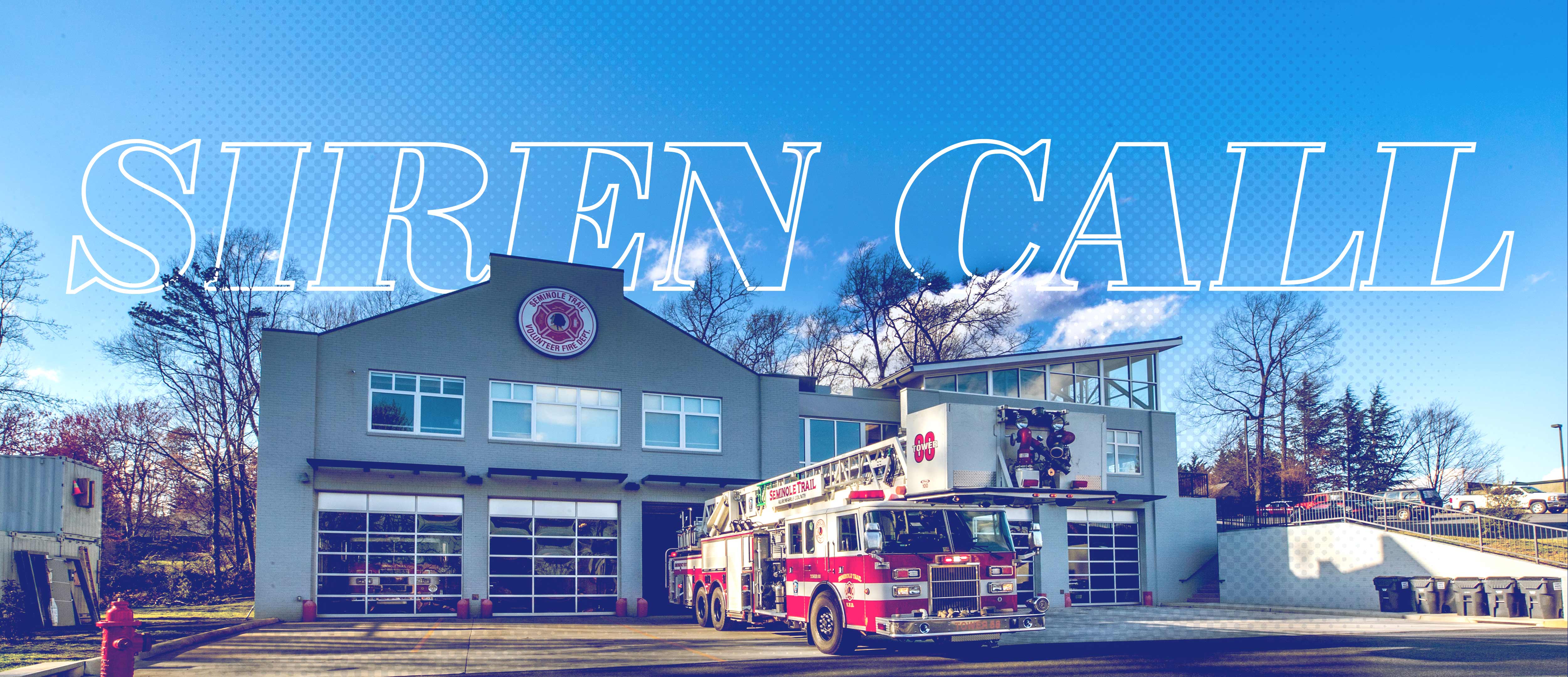Alice Thomson vividly remembers her first serious call as a rookie firefighter. Her engine turned a corner and she saw flames licking the sides of the lightning-struck house at the end of a cul-de-sac. Thick black smoke obscured the sky.
“Your immediate reaction is ‘Oh, crap. I’m going to have to do something here because I trained for it.’ Nothing can prepare you for actually seeing that in real life and knowing that you were the person that someone called to help them,” she said. “That day stuck with me because I actually was able to help. No one got injured and we were able to do our job well.”
Thomson is one of more than 100 University of Virginia students who volunteer as emergency responders with the Seminole Trail Volunteer Fire Department and the Charlottesville-Albemarle Rescue Squad. Many, like Thomson – a fourth-year student double-majoring in English and government – volunteer with both organizations.
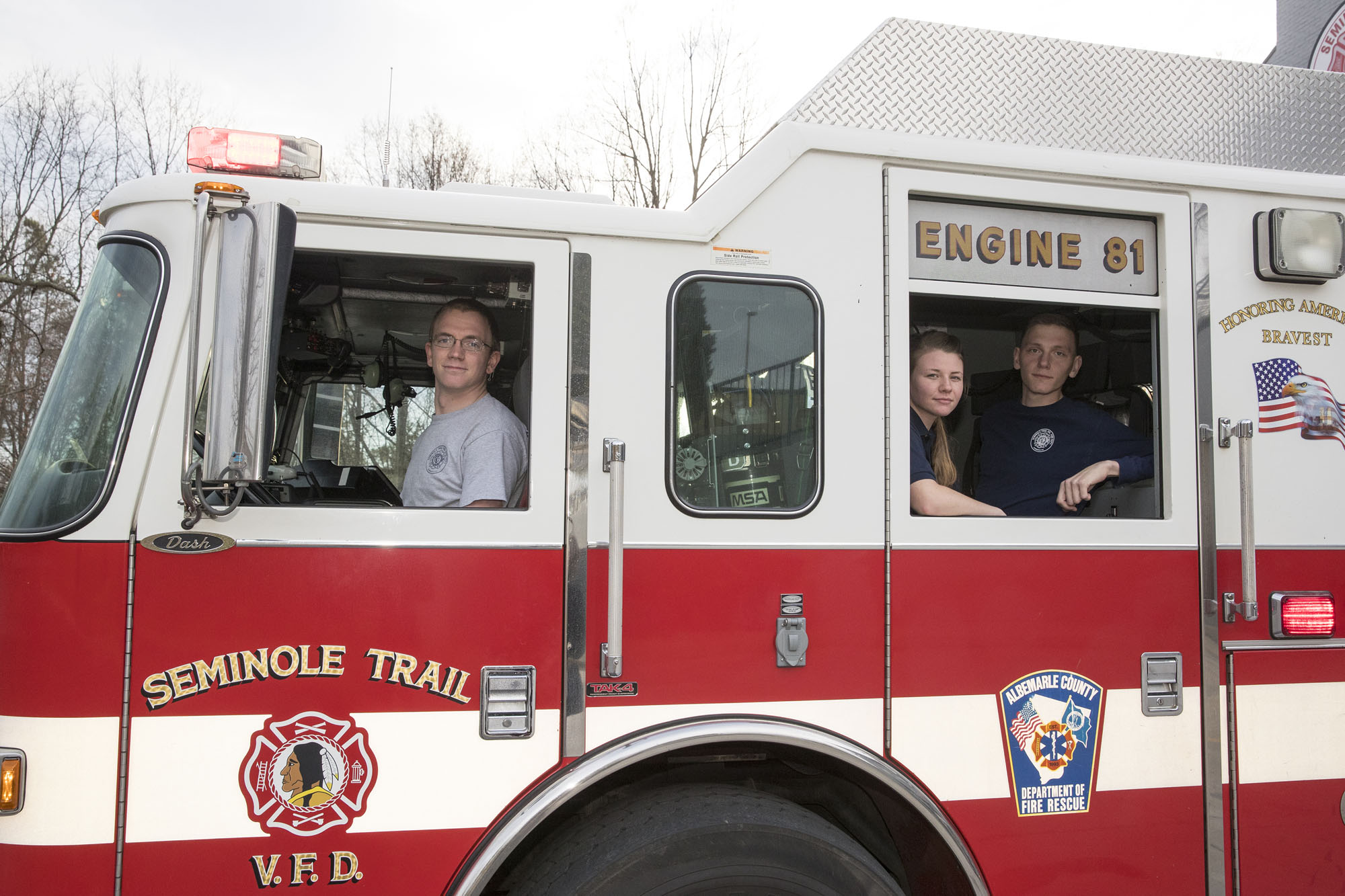
From left to right, UVA student volunteers Clayton Geipel, Alice Thomson and Jackson Muller. (Photos by Dan Addison, University Communications)
UVA students have a long tradition of volunteering as emergency responders, lending 12 hours a week and occasional 48-hour weekend shifts to help their fellow citizens. Many stay on as alumni, and some ascend to leadership positions. Seminole Trail Volunteer Fire Department Chief Brian Kester is a 1996 graduate of the McIntire School of Commerce, and Charlottesville-Albemarle Rescue Squad Chief Alex Belgard is a 2005 graduate of the School of Engineering and Applied Science.
“The kind of people who volunteer with fire departments and rescue squads are naturally inclined toward helping others,” Kester said. “They may not know that about themselves until they join us and explore that. Many of our members go on to careers in service after finding fulfillment in that here. Others of us find we’re still volunteering 24 years later. It becomes a big part of who we are.”
Ready in a Crisis
Fire and rescue volunteers undergo intense training before they’re allowed to assist on emergency sites. The nuts and bolts of responding to a crisis – quickly assessing damage, running water lines, setting ladders, etc. – all soon become ingrained, but it’s often the more nuanced skills that student volunteers learn to value the most.
“In my time at UVA, the biggest lessons I’ve learned through both organizations haven’t been medical in nature, but rather have been about compassion and managing stressful situations,” said Nazar Aljassar, a fourth-year statistics major and a volunteer with both the rescue squad and the Seminole Trail Volunteer Fire Department.
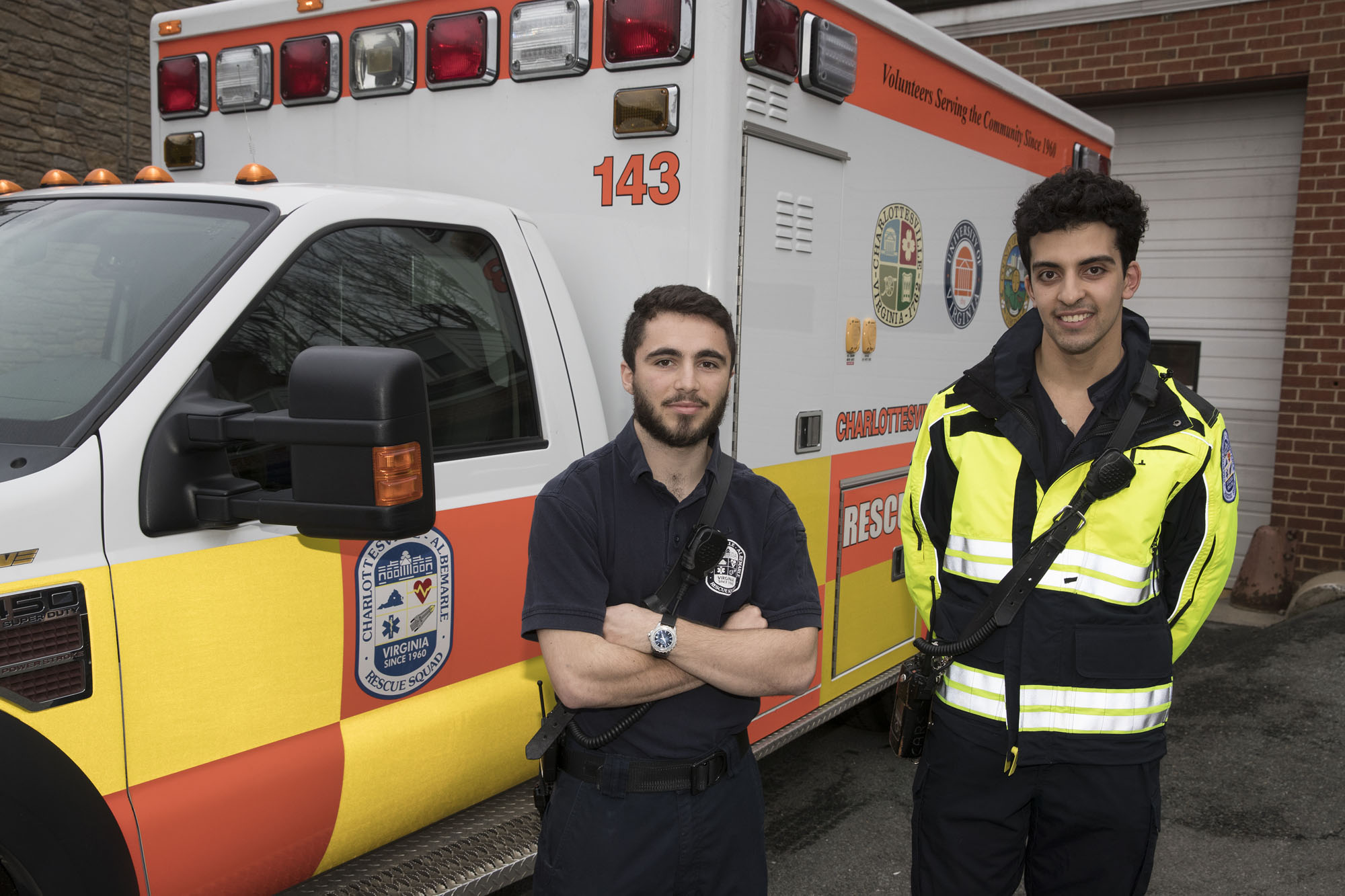
UVA students and Charlottesville-Albemarle Rescue Squad volunteers Alex Lupi (left) and Nazar Aljassar.
As first responders, Aljassar and his fellow volunteers regularly encounter people on one of the most difficult days of their lives, and find that being a friend and comfort to them can be just as important as putting out a fire or stopping the bleeding.
“One of my favorite calls to run are the little old ladies who have fallen and they just need someone to talk to them and reassure them,” said Jackson Muller, another dual volunteer and a third-year student majoring in English and American studies. “Those aren’t the most eventful calls, but they’re the ones where we feel like we’re doing the most when we do the least.”
In stressful situations, student volunteers have to learn to project calm empathy, working to reassure the victim and panicky family members even as they attack the underlying problem.
Clayton Geipel, an aerospace engineering graduate student, recalled an intense situation where his crew was called to perform a vehicle extrication. They were reaching into the car to bandage the trapped victim and working steadily to cut her out of the car, all while also trying to keep her calm and relaxed.
“We were with this patient for the better part of an hour as we were trying to work on this car, so part of my role was to reassure her that we were doing everything that we could as fast as we could,” he said. “It’s those little things that you might not think about until you’re there and you have to treat the patient as well as all the problems.”
A Strong Community
When they’re not running out for calls and running through training, student volunteers have a lot of time to spend together on those 12-hour shifts.
“Beyond the fulfillment of being able to help people who call 911 on their worst days, the best part of Seminole Trail is the camaraderie and fraternity that we all feel. We work hard together and we blow off steam together. We’re a family,” Kester said.
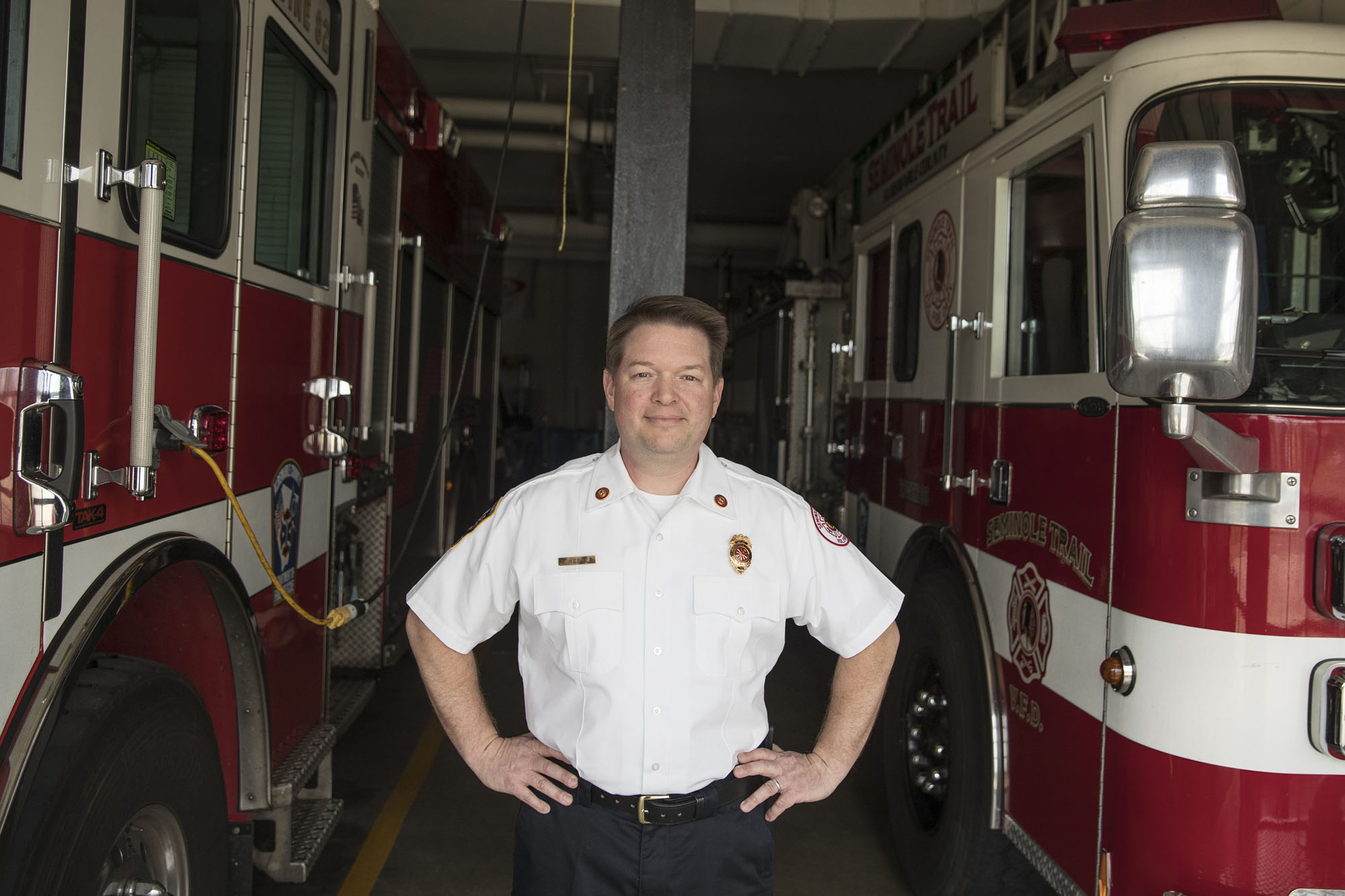
Brian Kester is the Seminole Trail Volunteer Fire Department chief and a 1996 graduate of the McIntire School of Commerce.
The station also brings students from all corners of UVA, forging lasting friendships among people who might never cross paths otherwise.
“Some of my best friends volunteer here, and I never would have met them without this because they’re in different schools and completely different classes than I am,” Thomson said. “It’s a great place to meet people and there’s just such a sweetness to doing this. It’s not like anything else.”
Between calls, students bond over chores as well as training at the station. While the tasks required to keep a large station clean and the crew well-fed may seem tiresome, Aljassar said that they have actually become some of his favorite parts of volunteering. Never much of a chef before he began volunteering, he now looks forward to the shifts where it’s his turn to shop for groceries and prepare dinner for his fellow volunteers.
“There’s a budget of course, but it’s fun to figure out how to use that to make something good for everyone,” he said. “I found this good baked salmon recipe a while back that’s become sort of my specialty.”
A Foundation for the Future
Some students are interested in this kind of volunteer work as a way to prepare them for a career in medicine, but they are hardly the only ones to join. Both the rescue squad and the volunteer fire departments attract students with a wide range of goals, and offer practical experience that is applicable in nearly every career field.
Aljassar and Muller both cited the importance of learning to think on their feet in high-stress situations as a skill that is certain to help them in their future, very different careers. After graduation, Aljassar will take a position as a business analyst in Dubai, while Muller, a member of UVA’s Navy ROTC unit, will eventually accept a commission as an officer in the U.S. Navy.
The experience of working in the community and learning to develop multifaceted responses to dangerous situations has inspired Thomson to seek a career in government service.
“I’m applying to grad schools now to study homeland security and emergency management, and there’s no way I would have thought to do that if I hadn’t done this first,” she said.
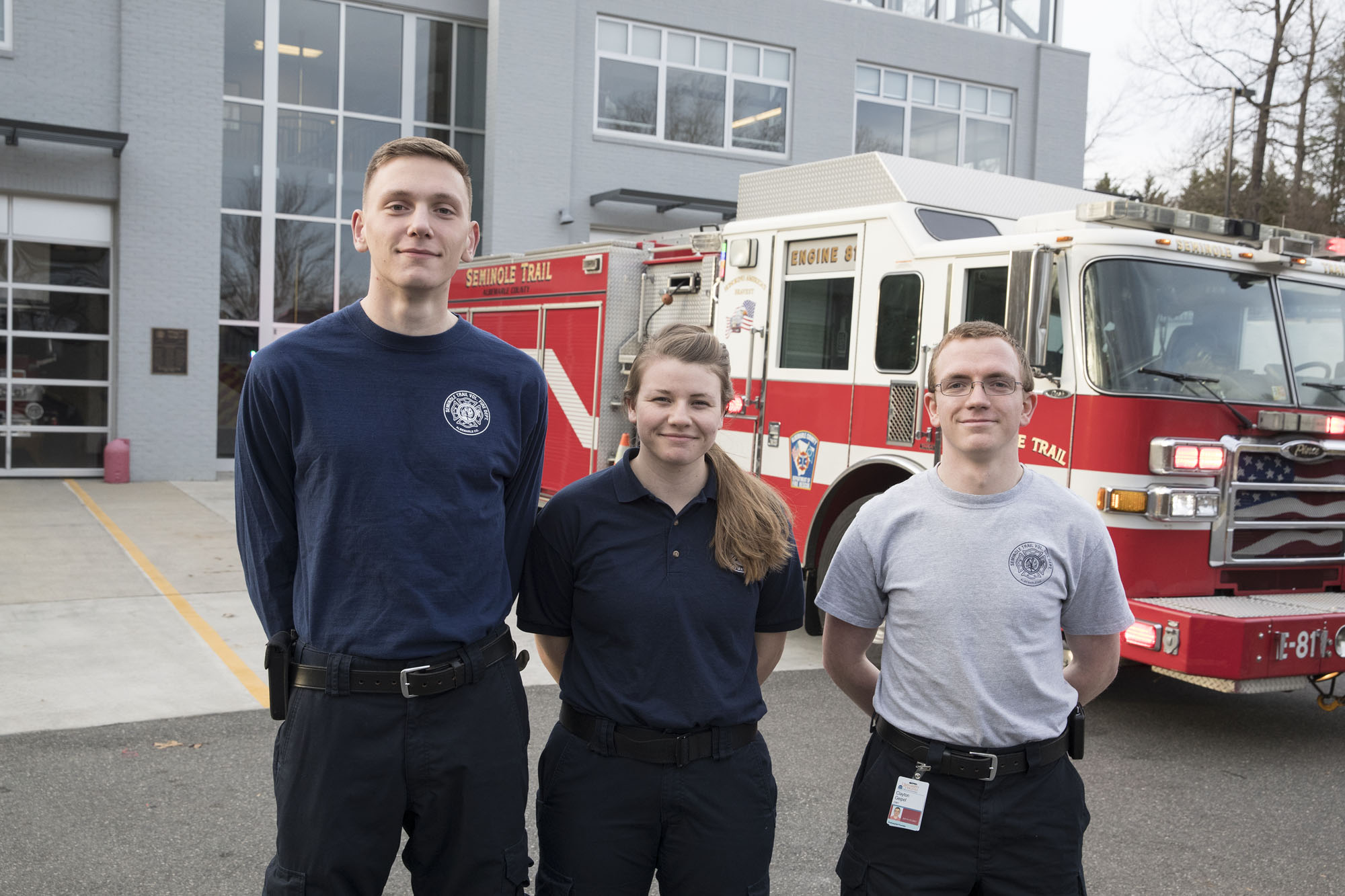
UVA students and Seminole Trail volunteer firefighters, from left to right, Jackson Muller, Alice Thomson and Clayton Geipel.
Even for those students who are interested in a career in medicine, like third-year neuroscience major Alex Lupi, some of the strongest skills they learn from the rescue squad aren’t strictly medical in nature.
“I think it gives you leadership experience more than anything,” he said. “You’re learning how to direct other people and how to be good at directing fellow EMTs.”
No matter what their future goals, all volunteers recommend that interested UVA students give emergency response a try. They encourage newcomers to sign up for “ride-alongs” to get a feel for what it’s like to go out on calls and experience the camaraderie of the station during the quieter hours.
“If you don’t experience it firsthand, you’ll never know if it’s for you,” Thomson said. “When I first joined and did my ride-alongs, I didn’t think that I’d ever get to the point where I’d be driving the engines, that I’d be an EMT or drive the [fire engine] tower, but I’ve accomplished all that. Everyone is really encouraging here. They want you to succeed and get all the qualifications that you can.”
Media Contact
Article Information
March 6, 2017
/content/siren-call-inside-lives-student-emergency-responders

